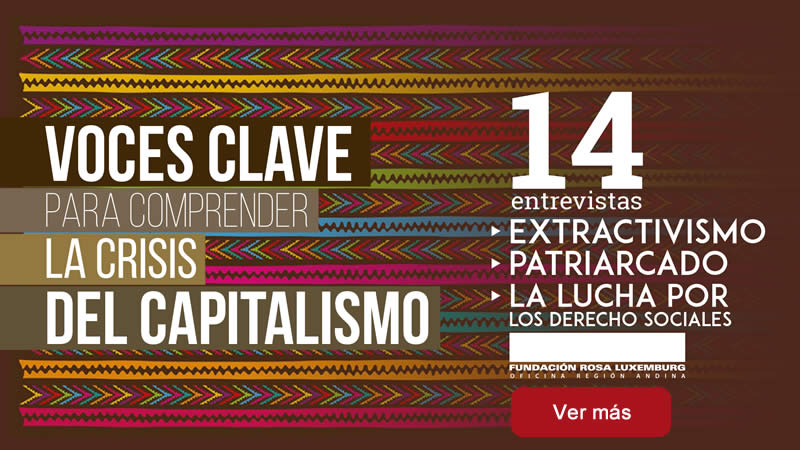In Latin America, we are going through a stage of ultra-capitalism or predatory capitalism. Limits are being pushed today that used to be unthinkable, like exploiting the last confines of nature, or an accelerated delegitimization of human rights that we had once thought to have been fully achieved. This position is reflected in the words of several members of the Permanent Working Group on Development Alternatives, who we interviewed in May 2018.
In these conversations, they provide interpretations on key issues involved in the global capitalist crisis: the exacerbation of environmental destruction, increasingly intolerant discourses relating to sexual and ethnic diversity, conservative attacks on women’s rights, and xenophobia.
In Latin America, the wide range of social struggles that have arisen in response to the capitalist crisis threatens not only freedoms, but the very survival of humanity, especially within populations that have been affected by extractivism. How can we rethink the strategies and possibilities of social resistance in this context?
It is our hope that this interview series serves as a tool in the search for answers to these urgent issues.
Rita Segato is an Argentine feminist anthropologist who is known as one of the representative intellectuals of Latin American Thinking. She analyzes the functionality between patriarchy and capitalism, explaining how capital intensifies patriarchal practices in today’s world.
Cristina Vega is a professor and researcher in the Department of Sociology and Gender Studies at FLACSO-Ecuador. She reflects on anti-feminist disputes and the neoconservative agenda to reestablish the patriarchy and authoritarianism in Ecuador and the region as a whole.
Carmen Aliaga is a Bolivian anthropologist and researcher for the Socio-Environmental Coordination Collective (CASA). She analyzes the current situation of the feminist movement and social struggles in Bolivia.
Paola Suárez is a feminist in the Popular Network of Savanna Women in Bogota. She discusses the demands and debates underway in Colombia and how they relate to the women’s movement. Suarez explains what she sees as a promising period for the Colombian feminist movement, which, amidst war and the peace process, has found a sense of unity.
Horacio Machado is a professor at the National University of Catamarca, assistant researcher for the National Council of Scientific and Technical Research (Conicet), and coordinator of the Southern Political Ecology CITCA-CONICET-UNCA research team. He analyzes the foundations and origins of modern capitalism, which entails naturalization and reconfiguration of patriarchal, classist, and racist domination.
Maristella Svampa is a sociologist and lead researcher for Conicet, as well as a professor at the La Plata National University (Argentina). Svampa analyzes the situation of extractivism in Latin America, the connection between modern capitalism and energy megaprojects, and how they affect food systems.
Alejandro Mantilla, an educator and researcher for the National Trade Union Institute CED-INS, positions himself from within social organizations to provide an interpretation of the current situation relating to extractivism in Colombia and alternatives to overcome it.
Emiliano Teran is sociologist at the Central University of Venezuela and member of Venezuela’s Political Ecology Observatory and the Latin American Oilwatch Network. He explains elements that are key to understanding neoextractivism and the current phase of extractivism in Venezuela.
Horacio Machado is a professor at the National University of Catamarca, assistant researcher for the National Council of Scientific and Technical Research (Conicet), and coordinator of the Southern Political Ecology CITCA-CONICET-UNCA research team. He analyzes the foundations and origins of modern capitalism, which entails naturalization and reconfiguration of patriarchal, classist, and racist domination.
Edgardo Lander, a full professor at the Central University of Venezuela and an associate researcher at the Transnational Institute, takes stock of the origins and strides taken in the struggle for fundamental human rights. He also reflects on how this relates to the resurgence of authoritarian tendencies to restrict rights. Lander also addresses the importance of the rights of nature and diverse forms of life in these times of ultracapitalism.
Luis Tapia, a Bolivian philosopher, professor, and researcher at the Universidad Mayor de San Andrés, in La Paz, delves into the issue of delegitimization of human rights in the current stage of capitalism and the need to introduce values of equality in society to combat cultural models like patriarchy and corruption.
Miriam Lang, professor in the Department of Social and Global Studies, the Climate Change Program, and the Latin American Cultural Studies Doctoral Program at the Simón Bolivar Andean University (Ecuador), addresses types of political power and participation in the region, emphasizing the need for radical democracy participants to be more active and less individualistic. She emphasizes the need to defend the notion of rights as a rule of collective coexistence, and not delegate these issues to the State.
Mario Rodríguez is a Bolivian journalist and educator who specializes in interculturality, urban issues, and cultural, communicative, and educational management. He explains how homogenization and individualization are ways in which capitalism is expressed in our daily lives. The alternatives to these realities are tied to fostering community relationships focused on coexistence. The experiences of indigenous communities are an example of this.
Elisa Vega, a nurse and doctor in the Kallawaya tradition, addresses the introduction of individual consumerism into the capitalist model and in community spaces, and proposes ancestral practices as an alternative.
Billy Navarrete, documentalist and executive secretary of the Permanent Committee for the Defense of Human Rights, analyzes the capitalist-induced stresses on universal human rights and the importance of social organization as an alternative to the neoliberal model.
Share interviews subtitled in English





